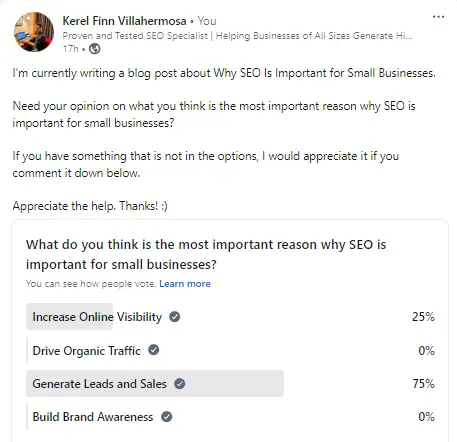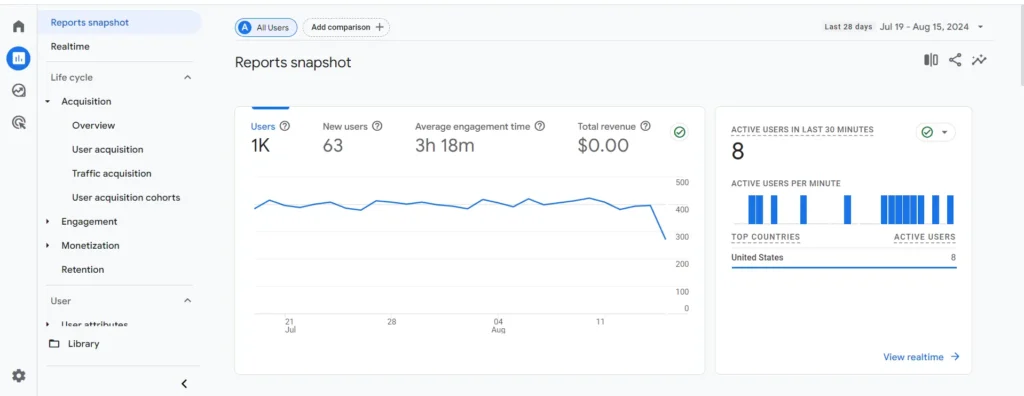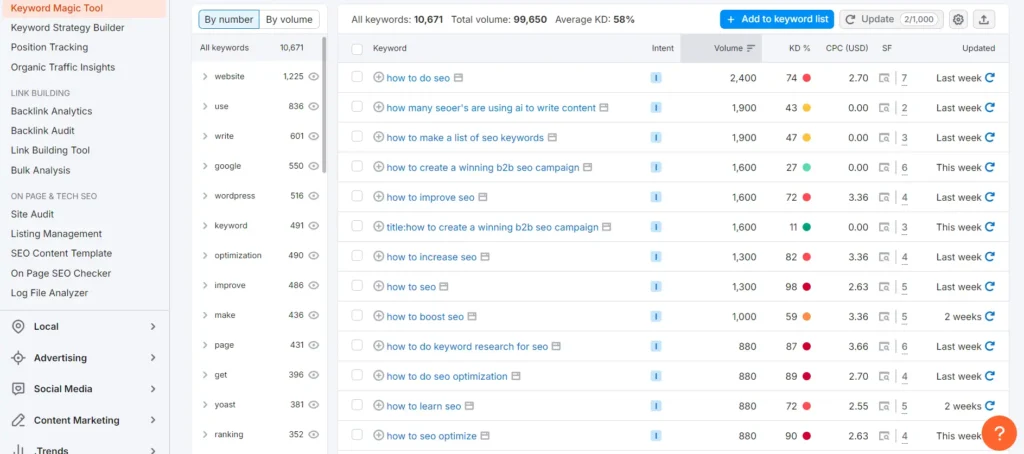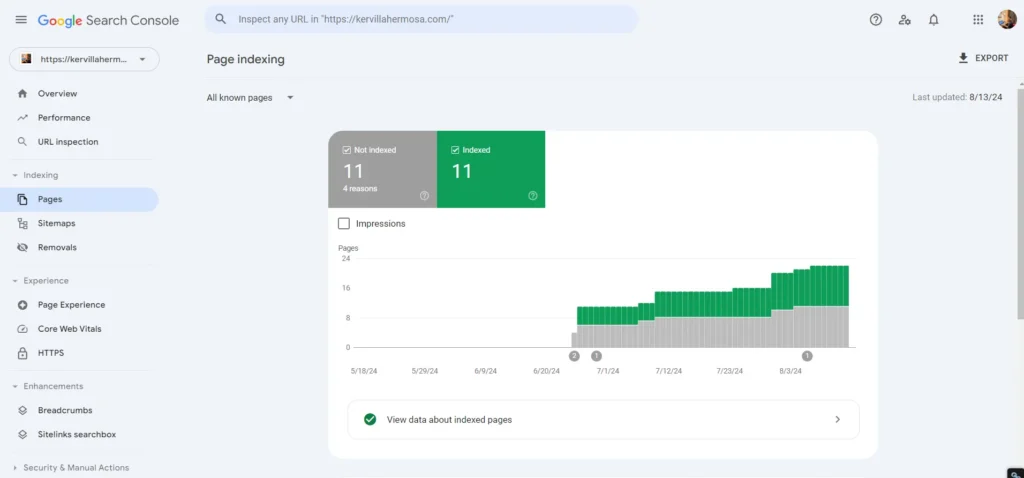In today’s digital age, having a strong online presence is crucial for small businesses.
This article discusses the importance of SEO (Search Engine Optimization) and how it can significantly impact your business’s success.
We’ll explore what SEO is, why it matters, and the common mistakes to avoid.
You’ll also learn practical strategies for improving your SEO, from building an optimized website to leveraging local search.
By the end, you’ll have a clear understanding of how to use SEO to stand out in a competitive market, with actionable steps to start seeing results.
Table of Contents
ToggleWhat is SEO, and Why Should Small Business Care?
You’ve got the best coffee beans, a fantastic pastry chef, and a playlist that sets the perfect vibe.
But there’s one problem—people don’t know you exist.
This is where SEO, or Search Engine Optimization, comes into play.
SEO is like the digital signpost that guides people to your door.
It’s the process of optimizing your online presence so that when someone searches for “best coffee in [Your Town],” your café pops up on their screen.
It’s not magic, but it sure feels like it when done right.
Now, why should small businesses care about SEO?
Well, in the bustling marketplace of the internet, SEO is your ticket to being seen.
Without it, your beautifully designed website and compelling content could be floating in a sea of online obscurity.
And let’s be honest, running a small business is hard enough without having to shout into the void, hoping someone hears you.
SEO helps level the playing field, allowing small businesses to compete with larger, more established companies.
It’s not about spending big bucks; it’s about being smart, strategic, and a little bit savvy.
After all, wouldn’t you rather be the café everyone’s talking about than the one no one’s ever heard of?
Impact of SEO on Small Business Success
SEO can be a game-changer for small businesses.
Think of it as the secret sauce that brings more people to your door—or in this case, your website.
By improving your search engine ranking, SEO helps your business get noticed by potential customers who are actively looking for what you offer.
When done right, SEO doesn’t just increase traffic; it attracts the right kind of traffic—the people most likely to become loyal customers.
This means more sales, more growth, and a stronger online presence.
In simple terms, SEO helps you succeed by making sure your business doesn’t just survive but thrives in the digital world.
8 Reasons Why I Believe SEO Is Important For Small Business
SEO isn’t just a buzzword—it’s an essential part of growing a small business in today’s online world.
Here’s why it matters so much.
Increase Online Visibility
Online visibility is the cornerstone of digital success for small businesses.
Think of it like having a prime location on a busy street but in the digital world.
SEO plays a critical role in ensuring your business appears where potential customers are looking—on the first page of search engine results.
Without strong SEO, your website might be buried beneath the pages of competitors, making it nearly invisible to potential customers.
By optimizing your website with relevant keywords, improving site structure, and creating high-quality content, SEO boosts your chances of being discovered by people searching for what you offer.
The more visible your business is online, the more likely you are to attract new customers who might not have found you otherwise.
Drive Organic Traffic
Organic traffic is the lifeblood of any small business’s online presence.
Unlike paid traffic, which requires a continuous investment in ads, organic traffic is driven by users who find your website naturally through search engines.
This kind of traffic is highly valuable because it brings in visitors who are actively seeking the products or services you offer.
Effective SEO strategies, such as optimizing for relevant keywords and improving content quality, help attract this organic traffic.
When your website appears higher in search results, more people will click on it, leading to an increase in visitors without the need for paid advertising.
Over time, this can result in a steady stream of potential customers, all from the power of SEO.
Improve User Experience
User experience (UX) is at the heart of successful SEO.
Search engines like Google prioritize websites that offer a seamless, enjoyable experience to visitors.
This means that aspects such as fast loading time, mobile-friendliness, easy navigation, and high-quality content are all key factors in ranking well.
When you focus on improving these elements, not only does your SEO benefit, but your users are more likely to have a positive experience on your site.
A well-optimized website keeps visitors engaged, reduces bounce rates, and encourages them to explore more of what you offer.
Importance of Local Search
For small businesses, local search is a game-changer.
When someone searches for a service or product “near me,” Google delivers results based on proximity, relevance, and prominence.
By optimizing your business for local SEO, you can ensure that your business appears in these local search results, putting you directly in front of potential customers who are nearby and ready to buy.
This involves optimizing your Google Business Profile, ensuring your name, address, and phone number (NAP) are consistent across the web, and gathering positive local reviews.
The power of local SEO lies in its ability to attract customers who are not just browsing, but who are often ready to make a purchase or visit your physical location.
Build Brand Awareness
SEO is a powerful tool for building brand awareness.
As your website climbs the search engine rankings, more and more people will see your brand name in their search results.
Even if they don’t click on your site the first time, repeated exposure to your brand name can make it more recognizable and trusted over time.
This increased visibility helps establish your business as an authority in your industry.
People are more likely to trust a brand that consistently appears in search results, which can lead to increased customer loyalty and word-of-mouth referrals.
In essence, SEO not only helps attract new customers but also strengthens your brand’s presence in the market.
Generate Leads and Sales
The ultimate goal of any marketing effort is to generate leads and drive sales, and SEO is no different.
I did a quick survey on LinkedIn about what is the most important reason why SEO is important for small business and turn out that generating leads and sales is the most important.

By targeting the right keywords and optimizing your website, you attract visitors who are actively looking for the products or services you offer.
These visitors are more likely to convert into leads and, eventually, paying customers.
Effective SEO ensures that your website is aligned with the search intent of your target audience.
When potential customers find exactly what they’re looking for on your site, they’re more likely to take action—whether that’s filling out a contact form, making a purchase, or signing up for a newsletter.
This targeted approach not only drives sales but also helps build a loyal customer base.
Here’s a great article from Nutshell about How to Use SEO for Lead Generation.
Also from Keap about 7 SEO lead generation tips to grow your business.
Gain a Competitive Edge
In the competitive landscape of small business, having an edge can make all the difference.
SEO gives you that edge by helping you outrank competitors in search results.
Even if you’re a smaller player in your industry, strong SEO can position you ahead of larger, more established companies online.
By continuously optimizing your website and staying up-to-date with SEO best practices, you can maintain your position in search rankings.
This competitive advantage can be especially crucial in saturated markets where customers have many options.
With effective SEO, you can stand out from the crowd and attract more business.
Achieve Long-Term Results
One of the most significant benefits of SEO is its ability to deliver long-term results.
While paid advertising stops generating traffic as soon as you stop paying, the impact of SEO can continue for months or even years after the initial work is done.
Once your website achieves a strong position in search results, it can maintain that position with minimal ongoing effort.
This means that your investment in SEO pays off over time, providing a steady stream of organic traffic without the need for constant spending.
By building a solid SEO foundation, you’re setting your business up for sustained success in the digital marketplace.
Common SEO Mistakes Small Businesses Should Avoid
While SEO can bring significant benefits, certain common mistakes can undermine your efforts.
Understanding these pitfalls can help you avoid them and ensure your SEO strategy is on the right track.
Ignoring Mobile Optimization
In today’s mobile-first world, ignoring mobile optimization is a critical mistake.
With more people browsing the internet on smartphones than ever before, search engines like Google prioritize mobile-friendly websites in their rankings.
If your site isn’t optimized for mobile devices—meaning it doesn’t load quickly, display correctly, or function smoothly on smaller screens—you’re likely to lose a significant amount of traffic and potential customers.
Neglecting Technical SEO
Technical SEO might not be as visible as other aspects of your strategy, but it’s just as important.
This involves optimizing the backend of your website to make sure search engines can easily crawl, index, and rank your pages.
Common technical SEO issues include slow page load times, broken links, poor site architecture, and missing basic on-page elements.
Neglecting technical SEO can cause your website to underperform in search rankings, no matter how great your content is.
Focusing Only on Short-Term Gains
SEO is a long-term strategy, and focusing only on short-term gains can be a big mistake.
Some businesses fall into the trap of using “black hat” SEO tactics, such as keyword stuffing or buying backlinks, to get quick results.
While these methods might boost your rankings temporarily, they can lead to penalties from search engines, which can severely damage your website’s visibility in the long run.
Instead, focus on sustainable, ethical SEO practices that build your website’s authority over time.
Underestimating the Power of Local Reviews
Local reviews are a powerful tool in your SEO arsenal, especially for small businesses.
Search engines consider reviews as a key factor in determining local search rankings.
Positive reviews not only boost your credibility with potential customers but also enhance your visibility in local search results.
Ignoring or underestimating the impact of local reviews can be detrimental.
Encourage your satisfied customers to leave positive reviews on platforms like Google Business Profile, Yelp, or industry-specific sites.
How to Improve SEO for Small Businesses?
Improving SEO for small businesses involves a combination of technical optimization, strategic content creation, and leveraging local opportunities.
Here’s a guide to help you enhance your SEO efforts.
Build an SEO-Friendly Website
An SEO-friendly website is the foundation of a successful digital strategy.
It’s about more than just making your site look good—it’s about making sure it performs well in search engines.
Start by ensuring your site is easy to navigate, with clear, logical menus and well-organized content.
A clean, intuitive design not only improves user experience but also makes it easier for search engines to crawl and index your pages.
Speed is another critical factor.
Websites that load quickly rank higher in search results and provide a better user experience.
Make sure your site is mobile-responsive, so it looks and functions well on all devices.
Don’t forget about security—implementing HTTPS encryption is a must for building trust with users and improving your search rankings.
Here’s a comprehensive guide from Ahrefs about How to Create an SEO-Friendly Website: The Complete Checklist.
Set Up Google Analytics and Google Search Console
Google Analytics and Google Search Console are essential tools for monitoring and improving your SEO.
Google Analytics gives you insights into how visitors interact with your site, including data on traffic sources, user behavior, and conversion rates.

This information helps you understand what’s working and where you can make improvements.
Google Search Console, on the other hand, focuses on how your site appears in Google search results.
It alerts you to any issues that might affect your rankings, such as crawl errors or mobile usability problems.
By regularly reviewing the data from these tools, you can make informed decisions about your SEO strategy and track the impact of your efforts over time.
Here’s a great article about How To Set Up Google Analytics 4 and How To Set Up Google Search Console.
Optimize Google Business Profile for Local SEO
Your Google Business Profile is a key element of local SEO.
It’s what appears in search results when people look for businesses like yours in their area.
To optimize your profile, make sure all your business information—name, address, phone number, and website URL—is accurate and consistent with what’s on your website and other directories.
Add photos, respond to reviews, and update your profile with any new information, such as holiday hours or special offers.
The more complete and active your profile is, the more likely it is to appear in local search results and attract customers in your area.
Here’s a nice guide from Search Engine Journal about How to Completely Optimize Your GBP Listing and from BrightLocal about How to Improve Local SEO Rankings.
Conduct Basic Keyword Research
Keyword research is the process of finding and analyzing the search terms that people enter into search engines.
This helps you understand what potential customers are looking for and how you can meet their needs.

Start with a list of topics related to your business, then use keyword research tools to find related terms that people are searching for.
Look for keywords with a good balance of search volume and competition.
Long-tail keywords—longer, more specific phrases—are often easier to rank for and can bring in highly targeted traffic.
Once you have a list of keywords, you can incorporate them into your website’s content, title tag, meta descriptions, and other on-page elements to improve your SEO.
Here’s My Personal Keyword Research Checklist that’s been proven and tested in my 9 years doing SEO.
Optimize On-Page Elements
On-page SEO involves optimizing the elements of your website that you have direct control over.
This includes your title tags, meta descriptions, headers, and image alt text.
These elements should include your target keywords and provide a clear, concise description of what each page is about.
Make sure your content is easy to read, with short paragraphs, bullet points, and subheadings that break up the text.
Internal linking—linking to other relevant pages on your site—can help visitors navigate your site and improve your search rankings.
By optimizing these on-page elements, you make it easier for search engines to understand your content and rank it accordingly.
Create High-Quality and Relevant Content
Content is one of the most important aspects of SEO.
Search engines prioritize websites that provide valuable, relevant information to users.
Focus on creating content that answers your customers’ questions, solves their problems, or offers insights into topics they care about.
High-quality content is well-researched, original, and free from errors.
It should be engaging and easy to read, with a clear structure and relevant keywords naturally incorporated.
Regularly updating your site with fresh content—whether it’s blog posts, articles, or videos—can help you attract and retain visitors while improving your search rankings over time.
Implementing a Link-Building Strategy
Link-building is the process of acquiring backlinks—links from other websites to your own.
Backlinks are a major factor in search engine rankings, as they signal to search engines that your site is trustworthy and authoritative.
Focus on earning high-quality backlinks from reputable sites in your industry.
You can build links by creating valuable content that others want to link to, such as informative articles, infographics, or case studies.
Reach out to industry blogs, websites, and influencers to promote your content and ask for links.
Remember, quality is more important than quantity—a few high-quality backlinks can have a bigger impact than many low-quality ones.
Here’s a modern and effective Product-led Link-building Strategies from Jason Acidre.
Tools I Personally Used to Track SEO Performance for Small Businesses
Tracking your SEO performance is crucial for understanding what’s working and where you need to improve.
The right tools can provide valuable insights, helping you refine your strategy and achieve better results.
Essential SEO Tools
To effectively track and optimize your SEO efforts, consider incorporating the following tools into your workflow.
However, as a small business, it’s crucial to keep your budget in mind and maximize the value you get from these tools.
I’ve personally used these tools while working with my small business clients, and they’ve proven to be both effective and cost-efficient.
Ahrefs
Ahrefs is a comprehensive SEO tool that helps you analyze your website’s performance, monitor your competitors, and find opportunities to improve your rankings.
It offers detailed insights into backlinks, keyword rankings, and content performance.
With Ahrefs, you can see which keywords bring traffic to your site, track your site’s ranking progress, and identify areas where you can gain an edge over your competitors.
Google Analytics
Google Analytics is a must-have tool for any small business
It provides detailed data on how visitors interact with your site, including where they come from, what pages they visit, and how long they stay.
By analyzing this data, you can identify trends, measure the effectiveness of your marketing campaigns, and make informed decisions to improve your website’s user experience and conversion rates.
Google Search Console

Google Search Console is essential for monitoring your website’s presence in Google search results.
It alerts you to any issues that might affect your rankings, such as crawl errors, mobile usability problems, or security issues.
Additionally, it provides insights into which queries bring users to your site and how your pages perform in search results.
Regularly reviewing and addressing the data in Google Search Console can help you maintain and improve your site’s SEO health.
Why a Holistic Approach to SEO Matters?
Taking a holistic approach to SEO means looking beyond just optimizing for search engines.
It’s about integrating SEO into your overall marketing strategy, ensuring that all parts of your business work together to drive success.
To learn more about Holistic SEO, here’s a great article from Yoast.
Let’s explore how this can be done.
Integrate SEO with Overall Marketing Strategy
SEO shouldn’t operate in a silo.
By integrating it with your broader marketing strategy, you can create a cohesive plan that drives consistent messaging and goals.
When SEO aligns with content marketing, social media, and email campaigns, you ensure that your brand is communicating a unified message across all channels, which can amplify your reach and impact.
Collaborate with Other Departments (e.g., PR, Content, and UX)
Collaboration between SEO and other departments like PR, content, and UX is essential.
PR can help secure backlinks, content teams can create material that’s both engaging and optimized, and UX ensures a smooth user experience that keeps visitors on your site.
When these departments work together, SEO efforts are more effective, and the overall user journey is improved.
Integrate SEO and Paid Advertising
Combining SEO with paid advertising can create a powerful combination.
While SEO focuses on organic growth, paid ads can drive immediate traffic.
By aligning these efforts, you can target the right audience at the right time, maximize visibility, and gain more conversions.
For example, insights from paid campaigns can inform keyword strategies for SEO, leading to a more efficient and effective marketing approach.
Need Help with Your SEO? Let's Talk!
If you’re looking for expert guidance to boost your small business’s online presence, I’m here to help.
As an experienced Freelance SEO specialist based in the Philippines, I can work with you to develop a tailored strategy that meets your business goals and drives growth.
Whether you need help with optimizing your website, improving your content, or tracking your SEO performance, I’m here to provide the support you need.
Feel free to visit my website for more information about my services, or email me directly to start a conversation about how we can enhance your online presence together.
Talk to you soon! 🙂
Kerel Finn Villahermosa is a Freelance SEO Specialist in the Philippines, specializing in enhancing website rankings and driving organic traffic. His innovative SEO strategies help businesses achieve their digital marketing goals.
- Kerel Finn Villahermosahttps://kervillahermosa.com/author/kerseo/
- Kerel Finn Villahermosahttps://kervillahermosa.com/author/kerseo/
- Kerel Finn Villahermosahttps://kervillahermosa.com/author/kerseo/
- Kerel Finn Villahermosahttps://kervillahermosa.com/author/kerseo/
